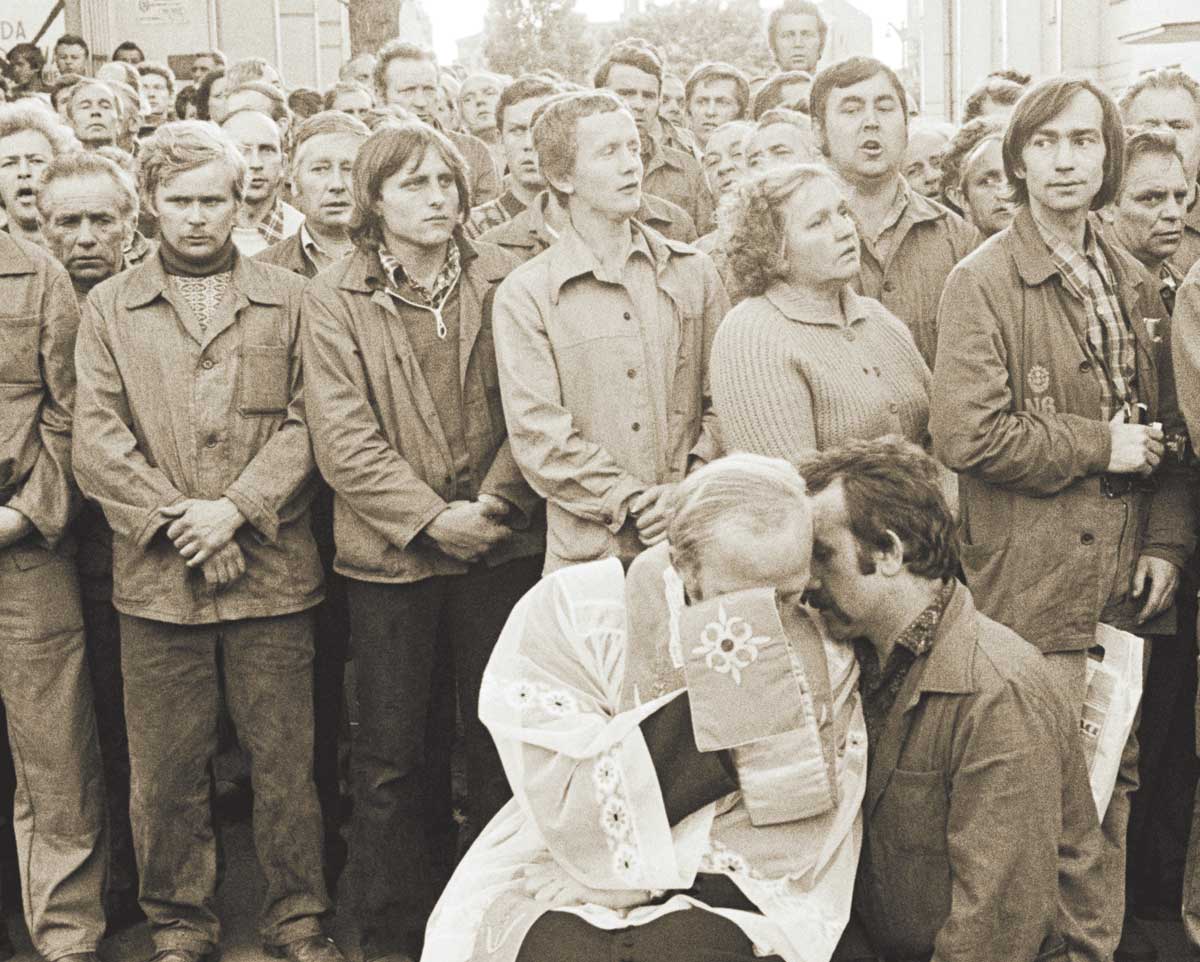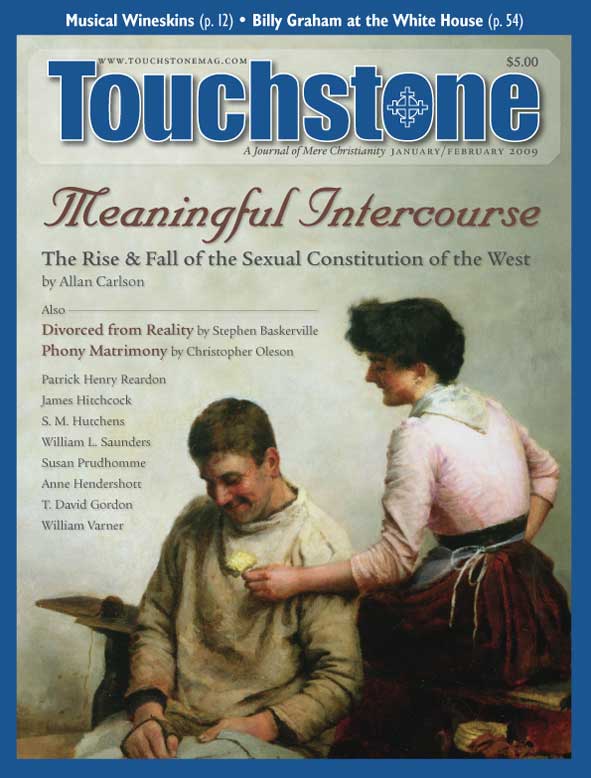Subject to Change
Can Traditional Societies Survive the Power of Modernity?
Cardinal Marc Ouellet of Quebec, in a remarkably frank interview, recently gave official confirmation to what has long been an open secret—the devastating decline of the Catholic Church in French Canada and the secularization of its culture, to the point where only immigrants bring a vital religious presence to that culture.
Visitors to Quebec Province are continually reminded—in guidebooks and historical material—of the Silent Revolution that occurred there during the 1960s, a combination of political separatism and the repudiation of traditional values, including an almost complete rejection of the authority of the Catholic Church.
Over the decade of the 1960s, church attendance declined precipitously (it is now about five percent), the birth rate fell to one of the lowest in the world, and every kind of sexual license was openly celebrated. The result is surreal—historic churches and streets named for saints are ubiquitous, but the soul has gone out of the body.
Faith or Mere Custom?
Quebec separatism at first seemed to be the Catholic side of Canadian society asserting itself against the Protestant side, but the fact that the moral revolution occurred in tandem with political separatism was not coincidental. Nationalism has often served as a conscious substitute for religion, and the more the Québécois asserted their independence from the Canadian Protestant establishment, the less Catholic they became. (Christians should be wary of the cult of “ethnicity”—costumes, music, language, cuisine—because it often serves precisely to fill the vacuum created by the abandonment of belief.)
The experience of Quebec, along with that of Ireland, Spain under Francisco Franco, the Netherlands, Scotland, and Puritan New England (earlier, the Old Regime all over Europe), illustrates a kind of iron law of history whereby change can only be shut out for a limited period of time and, once it breaks in, is catastrophic roughly in proportion to how long, and how rigorously, it has been kept out.
A closed traditional society finds it almost impossible to effect an orderly and controlled transition to modernity. Religion dominates all aspects of life to the extent that no distinction is made between matters of faith and mere custom. The Quebec clergy, for example, identified the purity of religion with rural life and a spirit of obedience, even obedience to the Protestant-dominated British Commonwealth.
Thus, it proves psychologically impossible to discard those things in traditional society that have outlived their legitimacy without thereby setting off global change. The changing culture fosters a half-conscious conviction that truth lies roughly in asserting the opposite of what one previously believed. Changes cannot be evaluated rationally, because people are carried along by a euphoric sense of having liberated themselves from long-standing, narrow oppressiveness.
Modern society offers an opportunity to exercise freedom in the fullest sense, an exercise that exposes the facts that what passes for deep conviction may be for many people merely a brittle social conformity, and what passes for morality may be the mere absence of opportunities for sin.
Muslims who see the United States as the Great Satan reject the good of political liberty along with the poisonous moral licentiousness that such liberty permits. They perceive the ambiguity of modernity itself, most of which either originated in the United States or has been propagated through American influence.
But for that very reason the antibodies to modern cultural viruses also exist most robustly in the United States, which is practically the only society in the Western world where moral traditionalists have an effective voice in public affairs.
Religious belief is stronger in America than anywhere else in the West partly because believers have had to find ways of living their faith without the kind of social supports that, historically, were provided in countries with established churches.
A Conundrum
Certain perhaps melancholy conclusions have to be drawn from all this, the chief of which is that the forces of modernity—political, economic, and cultural—really are irresistible and that sooner or later almost every society in the world will have to face them. (Not too many years ago, conservative American Catholics talked about moving to Ireland to escape American decadence.)
If that assumption is correct, it is better to experience modernity sooner rather than later, in order to make use of what is good in it and to learn to cope with what is bad. Simple quarantine is no longer possible.
There is a melancholy personal parallel here as well, in the attempt by families to protect themselves as far as possible from a decadent society by teaching their children at home, banishing television, and other measures. Such strategies are wise in many ways, but ultimately, it is impossible to arrange one’s life in such a way as to avoid all the realities of the culture.
Indeed, many families who homeschool their children and avoid television are aware of this impossibility. They know they cannot create a closed subculture like the Amish but are modestly trying to revive, or keep alive, some kind of Christian culture. As parents, they are not content simply to allow others to decide what a child should grow to love and to see as normal.
Both for societies and for individuals, our cultural situation is tragic in the classical sense, because it requires decisions none of which are free of possible bad consequences. Maintaining a rigorously closed society may protect generations of people from the worst evils of modernity, even as it virtually guarantees that later generations will be infected all the more virulently. But alternatively, allowing people a good measure of freedom inevitably leads to abuse.
One of the oldest and deepest assumptions of Western civilization is that the unexamined life is not worth living, and it is a perplexing theological conundrum to what extent real faith exists if the possibility of rejecting it does not exist also.
—James Hitchcock, for the editors
James Hitchcock is Professor emeritus of History at St. Louis University in St. Louis. He and his late wife Helen have four daughters. His most recent book is the two-volume work, The Supreme Court and Religion in American Life (Princeton University Press, 2004). He is a senior editor of Touchstone.
subscription options
Order
Print/Online Subscription

Get six issues (one year) of Touchstone PLUS full online access including pdf downloads for only $39.95. That's only $3.34 per month!
Order
Online Only
Subscription

Get a one-year full-access subscription to the Touchstone online archives for only $19.95. That's only $1.66 per month!
bulk subscriptions
Order Touchstone subscriptions in bulk and save $10 per sub! Each subscription includes 6 issues of Touchstone plus full online access to touchstonemag.com—including archives, videos, and pdf downloads of recent issues for only $29.95 each! Great for churches or study groups.
Transactions will be processed on a secure server.
more from the online archives

19.10—December 2006
Workers of Another World United
A Personal Commemoration of Poland’s Solidarity 25 Years Later by John Harmon McElroy
calling all readers
Please Donate
"There are magazines worth reading but few worth saving . . . Touchstone is just such a magazine."
—Alice von Hildebrand
"Here we do not concede one square millimeter of territory to falsehood, folly, contemporary sentimentality, or fashion. We speak the truth, and let God be our judge. . . . Touchstone is the one committedly Christian conservative journal."
—Anthony Esolen, Touchstone senior editor








